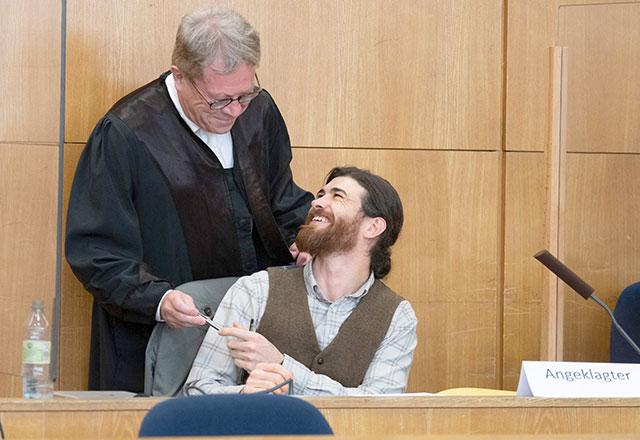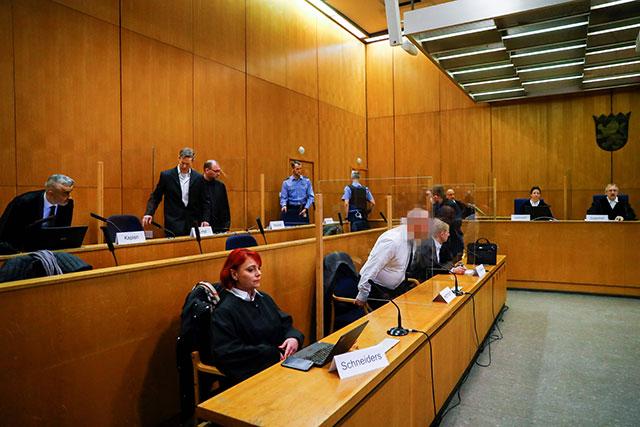You are here
Report shines light on right-wing extremism in German police
By AFP - Oct 07,2020 - Last updated at Oct 07,2020
BERLIN — Right-wing extremism is not a systemic problem in the German police despite hundreds of examples documented in a new report, Interior Minister Horst Seehofer said on Tuesday.
The much-anticipated report, compiled by the BfV domestic intelligence agency, identified 377 suspected cases of far-right extremism in the German police and intelligence services between January 2017 and March 2020.
It follows a string of scandals in Germany in recent months over far-right networks in the police and military, with pressure mounting on the government to address the issue.
"We are dealing with a small number of cases," Seehofer said at a press conference to introduce the report, stressing that more than 99 per cent of the police respect the constitution and have no connection to extremism.
"We have no structural problem with right-wing extremism in the state and federal security services," Seehofer said.
'Every case is a disgrace'
However, he added that "every proven case is a disgrace" given the role played by the police and security forces in setting an example for the public.
Around 300,000 members of the security forces were asked to fill out anonymous questionnaires for the report in the hope of breaking what unions and experts have called a culture of silence.
The report identified 319 suspected cases of right-wing extremism in Germany's state police forces, as well as 58 at the federal level, including 44 in the federal police.
But Dieter Romann, the head of the federal police, also said Tuesday there is "no right-wing extremist network within the federal police".
Several regional German police forces have been caught up in far-right scandals in recent months, and a unit of the country's elite KSK commando force was dissolved in July over neo-Nazi allegations.
The German government had previously refused to carry out a full investigation into extremism as it feared tarnishing the reputation of the police and intelligence services, instead favouring a case-by-case approach.
But in a change of stance last week, Seehofer said the government would take a "rigorous" approach and "not cover anything up".
The Social Democrats, the junior partner in Angela Merkel's coalition government, have repeatedly demanded action, and German President Frank-Walter Steinmeier called in September for a "more resolute" fight against right-wing extremism.
Germany has been hit by a string of far-right attacks over the last 18 months, leading to Seehofer naming far-right extremism the "biggest security threat facing Germany".
But at the same time, evidence has mounted of far-right extremism within the police, security forces and military.
Links between the far right and the police are suggested by the makeup of the Bundestag lower house of parliament, where five of the far-right AfD Party's 89 MPs are police officers — the highest number of any party.
Hitler images
In Germany's most populous state of North Rhine-Westphalia, 30 police officers were suspended in September for spreading "repulsive" far-right propaganda in online chatrooms including swastikas, pictures of Adolf Hitler and a digitally altered image of a refugee in the gas chamber of a concentration camp.
A similar case was uncovered in Berlin in late September.
In July, prosecutors announced the arrest of a former police officer and his wife whom they suspect of having sent threatening e-mails to politicians and other public figures across Germany.
The anonymous messages were all signed "NSU 2.0", a reference to the German neo-Nazi cell National Socialist Underground that committed a string of racist murders in the 2000s.
The so-called "NSU 2.0 affair" has already claimed the scalp of police chief Udo Muench of the state of Hesse, who resigned after it emerged that police computers were used to search for details about a far-left politician who subsequently received one of the threatening letters.
Meanwhile, Defence Minister Annegret Kramp-Karrenbauer ordered the partial dissolution of the KSK commando force in June after revelations that some of its members harboured neo-Nazi sympathies.
The elite force is charged with sensitive and risky missions such as hostage rescue operations or anti-terror action abroad.
Germany's Military Counterintelligence Service (MAD) has said some 600 Bundeswehr soldiers were suspected of right-wing extremism, including 20 in the elite force.
Related Articles
FRANKFURT — A German soldier who posed as a Syrian refugee denied plotting an attack on high-ranking politicians as he went on trial in Fran
BERLIN — A German neo-Nazi was sentenced on Thursday to life in prison for murdering pro-migration politician Walter Luebcke, a killing that
BERLIN/DRESDEN, Germany — The trial of a neo-Nazi "terrorist" cell accused of plotting a violent political uprising in Germany&nbs














